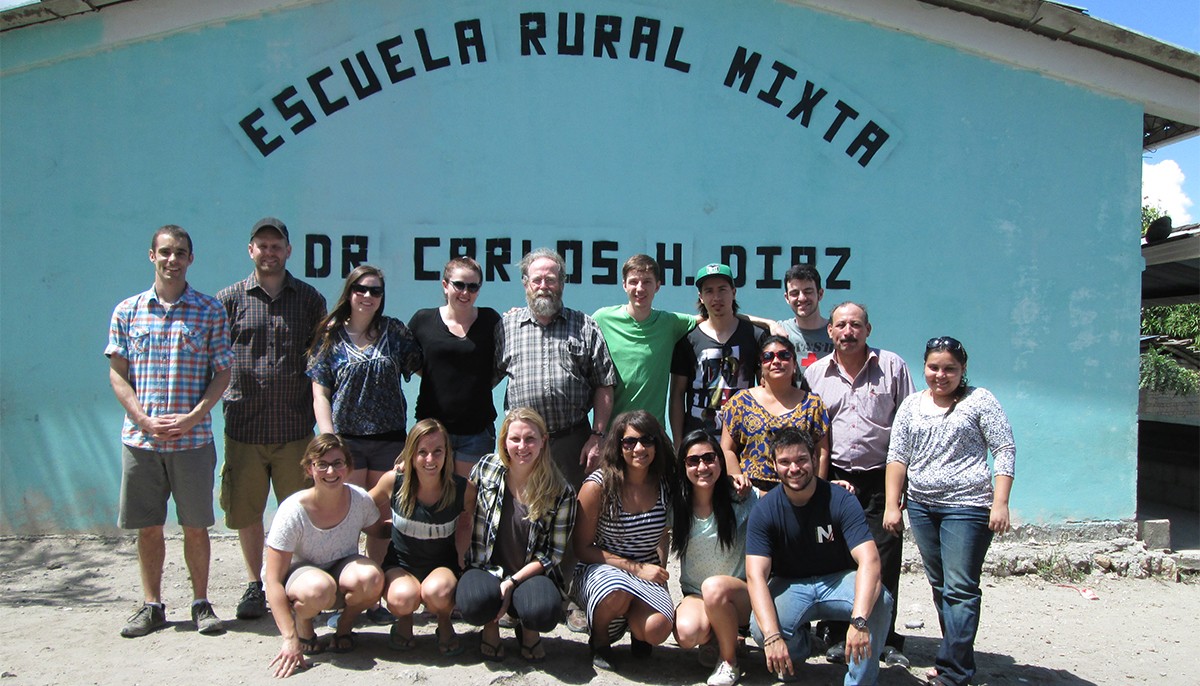
The 2014 project design team with teachers and the principal of a school in Honduras
Experiential Learning: Finding Sustainable solutions in Honduras
WHO: Kris Dick, professor in biosystems engineering.
WHAT: Dick, along with a graduate and undergraduate student, founded the Growing Village, a U of M research project focused on alternative and sustainable buildings and associated construction technologies. Every year, Dick and his engineering students travel to the surrounding areas of Gracias Lempira, Honduras, where they work with locals to implement their designs. Students from the Faculty of Architecture and College of Nursing also take part.
HOW IT WORKS: This service-learning experience has students designing and building various infrastructure components for sustainable living in rural regions of the Central American country. Projects are chosen through collaboration with NGOs and local community leaders. To date, they have included housing, rainwater collection systems, water filtration systems, latrines and stoves. The student group—established at the university in 2012—is called Students for Sustainability. They do research, prototyping and design work on actual projects from Honduras during the fall semester, exploring sustainable, low-impact contextual designs that are culturally sensitive and use locally available materials and tools. The group then travels south in February to live and work with local Hondurans as they implement their designs.
WHY IT’S IMPORTANT: In 1998, Hurricane Mitch damaged or destroyed more than 83,000 homes in this region;70 per cent of crops and transportation infrastructure werealso destroyed. In 2009, floodingconsiderably deteriorated the road network. Today, more than 60 per cent of locals live in poverty and roughly half of rural residents live in what’s considered extreme poverty.
THE GOAL: To empower the communities in Honduras to make sustainable, environmentally friendly and healthy decisions. And to provide students with a hands-on learning experience. “[This partnership] allows students a chance to apply their education to the real needs affecting the underserved Honduras population,” says Dick. “Working in a foreign environment gives students a global perspective while they learn first-hand the challenge of taking designs from paper to reality.”
THE INSPIRATION: “All of our students have said that this experience has had a profound impact on their lives,” says Dick. “From a personal perspective I am inspired by the students I have had the pleasure to work with. We have a lot of work to do in a short time. It is very rewarding when everyone pulls together with a positive attitude to make things happen. We truly work as a team.”
A MOMENT THAT MATTERED: “This past year we worked at an elementary school. It was a special moment when the project was done and we celebrated with the whole school. There were tears of joy for what we were able to do for the school and sorrow that we had to leave,” says Dick. “Even though we are in country for a short time there seems to be a real connection that our students make with our project community. This is especially true with the host families our students live with.”
FUNDERS: TD Engineering, Manitoba Council for International Cooperation, Faculty of Engineering Endowment Fund, Faculty of Agricultural and Food Science Endowment Fund, and many other individual and corporate donors
LEARN MORE






